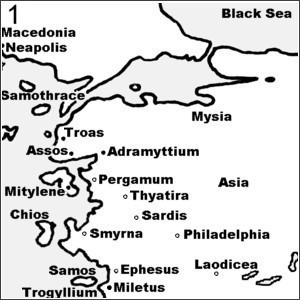
Common Notes on the Seven Messages
—Revelation 2 and 3
The Revelation of Christ (Revelation 1-5) >Seven Churches >Common Notes
The messages to the seven churches all start with the same elements. The messages all end in a similar way too. Rather than clutter the commentary on each message with repetition, I have placed some common notes below.
1 The Angels
"To the angel..." There are a lot of theories and assertions about the angel not being an angel but an ordinary mortal. There is no reason, however, to say that "angel" in these messages has a different meaning to elsewhere in the book of Revelation. In all other passages, angel means angel.
Each local church, though in an earthly place, is in direct contact with heaven. Why shouldn't an angel be personally involved in each church as part of God’s providence for keeping intact each church's association with heaven? "He makes his angels winds and his ministers a flame of fire" (Hebrews 1:7).
Even if there is not an actual angel associated with each church, and we take the idea of "the angel of the church" as symbolic of the church's spiritual relationship with heaven, angel still means angel.
2 The Christ
"The One who..." The statements following these words are descriptions related to the vision of Christ in chapter one. They are descriptions that identify Christ. Each description relates to the particular message which they introduce.
3 The Judgments, Exhortation, and Promises
"I know..." The statements following these words describe the condition of the congregation as to their zeal, faithfulness, and perserverence. The things Jesus says are reflected in the visions to be described later in the book.
"He who has an ear..." Each message ends with the same exhortation to hear what the Spirit says to the churches. The Holy Spirit helped John to write accurately what he was told, just as the Spirit inspired other writers of the New Testament.
"I will..." Each message ends with a marvellous and motivating promise. Each message, although it may condemn sin and call for repentance, ends on a note of great hope.
